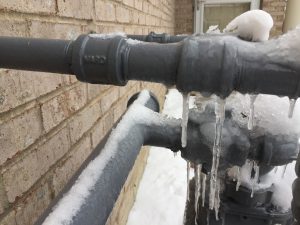Essential Strategies for Preventing Frozen Pipes in Winter
Essential Strategies for Preventing Frozen Pipes in Winter
Blog Article
Each person has their unique thoughts when it comes to Winter Plumbing Precautions: Preventing Frozen Pipes.

Winter can ruin your pipes, especially by freezing pipes. Below's just how to avoid it from occurring and what to do if it does.
Introduction
As temperature levels decrease, the risk of icy pipes rises, possibly resulting in pricey repair services and water damage. Recognizing exactly how to stop frozen pipelines is important for homeowners in chilly environments.
Prevention Tips
Shielding prone pipes
Cover pipes in insulation sleeves or utilize warmth tape to protect them from freezing temperature levels. Concentrate on pipes in unheated or outside locations of the home.
Home heating methods
Maintain interior rooms effectively heated, particularly areas with plumbing. Open cupboard doors to enable cozy air to distribute around pipelines under sinks.
How to recognize frozen pipelines
Look for reduced water flow from taps, uncommon odors or sounds from pipes, and visible frost on revealed pipelines.
Long-Term Solutions
Structural changes
Consider rerouting pipes away from exterior walls or unheated areas. Add additional insulation to attics, cellars, and crawl spaces.
Updating insulation
Purchase top notch insulation for pipes, attic rooms, and wall surfaces. Proper insulation aids preserve consistent temperature levels and reduces the risk of icy pipes.
Shielding Outdoor Pipes
Garden tubes and outdoor taps
Separate and drain garden pipes before winter months. Set up frost-proof faucets or cover outdoor taps with insulated caps.
Comprehending Icy Pipes
What triggers pipelines to freeze?
Pipes ice up when exposed to temperatures listed below 32 ° F (0 ° C) for expanded periods. As water inside the pipes freezes, it broadens, taxing the pipeline wall surfaces and possibly causing them to burst.
Risks and damages
Frozen pipelines can bring about water system interruptions, residential or commercial property damage, and expensive repair services. Burst pipelines can flooding homes and create considerable architectural damages.
Indications of Frozen Piping
Recognizing icy pipelines early can stop them from bursting.
What to Do If Your Pipelines Freeze
Immediate activities to take
If you suspect icy pipelines, keep faucets available to soothe pressure as the ice thaws. Use a hairdryer or towels taken in warm water to thaw pipes gradually.
Verdict
Stopping icy pipes needs aggressive steps and fast responses. By comprehending the reasons, indicators, and preventive measures, house owners can shield their plumbing during cold weather.
Helpful Tips to Prevent Frozen Pipes this Winter
UNDERSTANDING THE BASICS: WHY PIPES FREEZE AND WHY IT’S A PROBLEM
Water freezing inside pipes is common during the winter months, but understanding why pipes freeze, and the potential problems it can cause is crucial in preventing such incidents. This section will delve into the basics of why pipes freeze and the associated problems that may arise.
THE SCIENCE BEHIND FROZEN PIPES
When water reaches freezing temperatures, it undergoes a physical transformation and solidifies into ice. This expansion of water as it freezes is the primary reason pipes can burst. As the water inside the pipe freezes, it expands, creating immense pressure on the walls. If the pressure becomes too great, the pipe can crack or rupture, leading to leaks and water damage.
FACTORS THAT CONTRIBUTE TO PIPE FREEZING
Low Temperatures: Extremely cold weather, especially below freezing, increases the risk of pipes freezing. Uninsulated or Poorly Insulated Pipes: Pipes located in unheated areas, such as basements, crawl spaces, or attics, are more prone to freezing. Insufficient insulation or lack of insulation altogether exacerbates the problem. Exterior Wall Exposure: Pipes running along exterior walls are susceptible to freezing as they encounter colder temperatures outside. Lack of Heating or Temperature Regulation: Inadequate heating or inconsistent temperature control in your home can contribute to frozen pipes. PROBLEMS CAUSED BY FROZEN PIPES
- Pipe Bursting: As mentioned earlier, the expansion of water as it freezes can cause pipes to burst, resulting in significant water damage.
- Water Damage: When pipes burst, it can lead to flooding and water damage to your property, including walls, ceilings, flooring, and personal belongings.
- Structural Damage: Prolonged exposure to water from burst pipes can compromise the structural integrity of your home, leading to costly repairs.
- Mold and Mildew Growth: Excess moisture from water damage can create a favorable environment for mold and mildew growth, posing health risks to occupants.
- Disrupted Water Supply: Frozen pipes can also result in a complete or partial loss of water supply until the issue is resolved.
WHY CERTAIN PIPES ARE MORE PRONE TO FREEZING
- Location: Pipes located in unheated or poorly insulated areas, such as basements, crawl spaces, attics, or exterior walls, are at higher risk of freezing.
- Exterior Pipes: Outdoor pipes, such as those used for irrigation or exposed plumbing, are particularly vulnerable to freezing as they are directly exposed to the elements.
- Supply Lines: Pipes that carry water from the main water supply into your home, including the main water line, are critical to protect as freezing in these lines can affect your entire plumbing system.
- Underground Pipes: Pipes buried underground, such as those connected to sprinkler systems or outdoor faucets, can be susceptible to freezing if not properly insulated.
https://busybusy.com/blog/helpful-tips-to-prevent-frozen-pipes-this-winter/

Hopefully you enjoyed our excerpt on How to prepare your home plumbing for winter weather. Thank you for taking time to read through our post. Loved our content? Please share it. Let others locate it. I praise you for your time. Return soon.
Check This Out Report this page